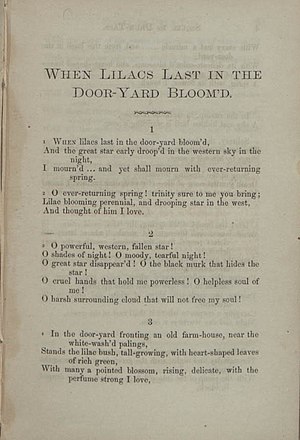| When Lilacs Last in the Dooryard Bloom'd | |
|---|---|
| by Walt Whitman | |
 The poem's first page in the 1865 edition of Sequel to Drum-Taps | |
| Written | 1865 |
| First published in | Sequel to Drum-Taps (1865) |
| Country | United States |
| Language | English |
| Form | Pastoral elegy |
| Meter | Free verse |
| Publisher | Gibson Brothers (Washington, DC) |
| Publication date | 1865 |
| Lines | 206 |
| Full text | |
"When Lilacs Last in the Dooryard Bloom'd" is a long poem written by American poet Walt Whitman (1819–1892) as an elegy to President Abraham Lincoln. It was written in the summer of 1865 during a period of profound national mourning in the aftermath of the president's assassination on 15 April of that year.
The poem, written in free verse in 206 lines, uses many of the literary techniques associated with the pastoral elegy. Despite being an expression to the fallen president, Whitman neither mentions Lincoln by name nor discusses the circumstances of his death in the poem. Instead, he uses a series of rural and natural imagery including the symbols of the lilacs, a drooping star in the western sky (Venus), and the hermit thrush, and he employs the traditional progression of the pastoral elegy in moving from grief toward an acceptance and knowledge of death. The poem also addresses the pity of war through imagery vaguely referencing the American Civil War (1861–1865), which effectively ended only days before the assassination.
Written ten years after publishing the first edition of Leaves of Grass (1855), "When Lilacs Last in the Dooryard Bloom'd" reflects a maturing of Whitman's poetic vision from a drama of identity and romantic exuberance that has been tempered by his emotional experience of the American Civil War. Whitman included the poem as part of a quickly written sequel to a collection of poems addressing the war that was being printed at the time of Lincoln's death. These poems, collected under the titles Drum-Taps and Sequel to Drum-Taps, range in emotional context from "excitement to woe, from distant observation to engagement, from belief to resignation" and "more concerned with history than the self, more aware of the precariousness of America's present and future than of its expansive promise."[1] First published in autumn 1865, "When Lilacs Last in the Dooryard Bloom'd"—along with 42 other poems from Drum-Taps and Sequel to Drum-Taps—was absorbed into Leaves of Grass beginning with the fourth edition, published in 1867.
The poem is one of several that Whitman wrote on Lincoln's death. Although Whitman did not consider the poem to be among his best, it has been compared in both effect and quality to several acclaimed works of English literature, including elegies such as John Milton's Lycidas (1637) and Percy Bysshe Shelley's Adonais (1821). [citation needed]
